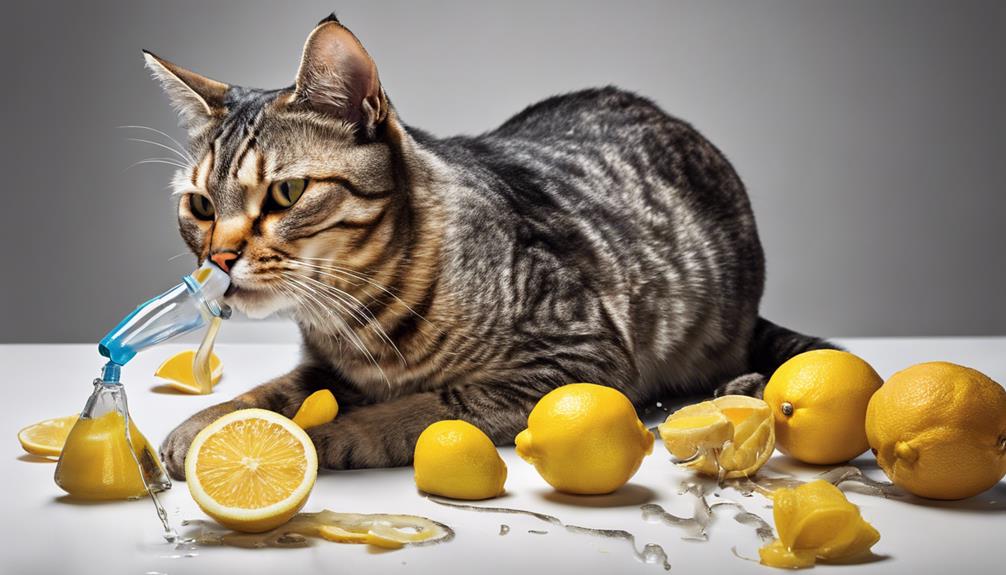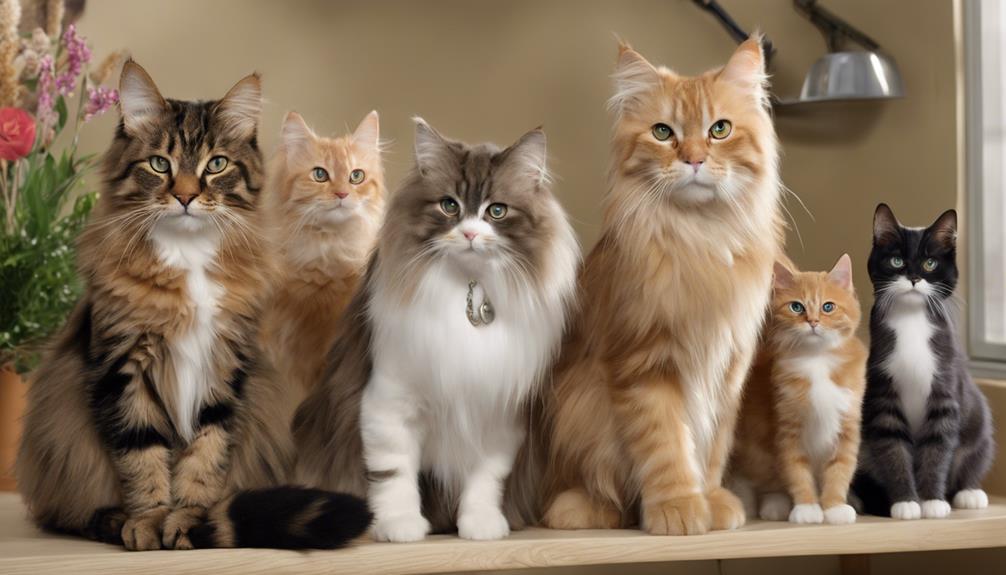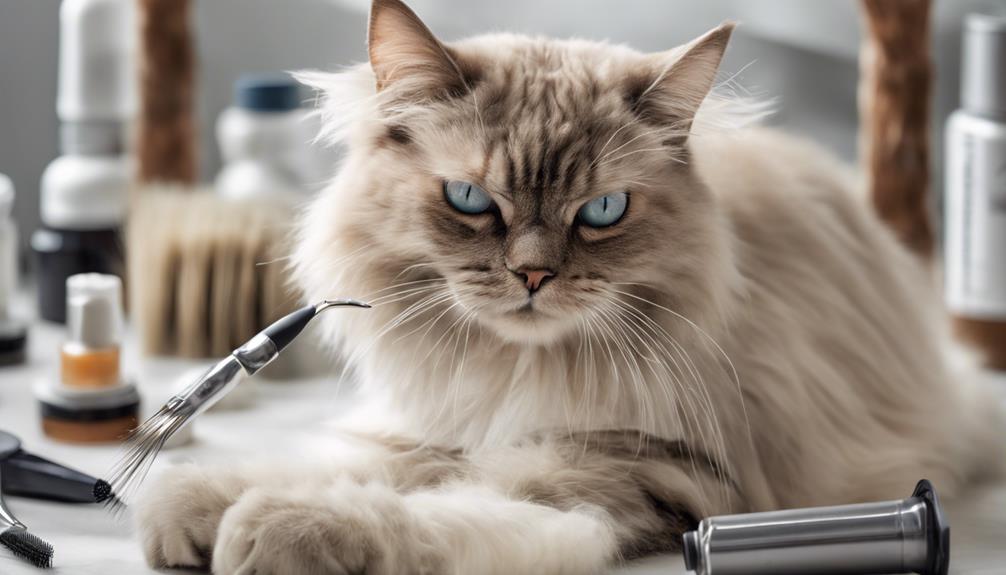Regarding scents cats detest, citrus fragrances like lemon, lime, and orange are at the top. They also avoid lavender, eucalyptus, rosemary, thyme, banana, mustard, pepper, and cinnamon scents. Additionally, pine smells, unpleasant litter box odors, skunk spray, Coleus canina, and artificial fragrances are on their list of dislikes. Cats have a strong sense of smell, making them very sensitive to certain aromas. To keep your feline companions comfortable, it’s best to avoid using these scents. They are interested in learning more about scents that cats can’t stand? Stay tuned for additional insights into their olfactory preferences.
Key Takeaways
- Cats hate citrus scents like lemon, lime, and orange.
- Lavender and eucalyptus scents repel cats and can be toxic.
- Avoid scents like rosemary, thyme, banana, and mustard.
- Cats dislike mint, menthol, and pine fragrances.
- Skunk spray, Coleus canina, and dirty litter box odors deter cats.
Citrus Smells
We avoid citrus scents in our household, knowing how much our feline friends detest them. Cats have a strong sense of smell, making citrus smells like lemon, lime, and orange overpowering and unpleasant to them. These scents can even cause vomiting and diarrhea in cats if ingested, so it’s vital to keep citrus-scented products away from areas where our furry companions roam.
Due to their instinctive aversion to citrus scents, cats may actively avoid places where these smells are present. It’s fascinating how their keen sense of smell guides their behavior, leading them to steer clear of anything that carries the sharp tang of citrus. Observing our cats’ avoidance behaviors towards citrus-scented items highlights the importance of understanding and respecting their preferences.
Lavender & Eucalyptus

It’s common knowledge that cats react strongly to certain scents, and lavender and eucalyptus are two fragrances they definitely dislike. These aromas mightn’t be cat-friendly, as they can lead to drooling, vomiting, or even respiratory problems in our feline companions.
To keep our cats safe and happy, it’s best to steer clear of products containing lavender or eucalyptus and opt for scents that won’t cause any harm.
Strong Scents Repel
The strong scents of lavender and eucalyptus are known to repel cats due to their dislike for these aromas. Cats have a natural aversion to these fragrances, which can even lead to drooling and vomiting if ingested. Essential oils containing lavender and eucalyptus are considered toxic to cats, making it vital to avoid using them around our feline friends.
Cats are intuitive creatures and will often steer clear of areas where these scents are present to protect themselves. To guarantee our cats’ safety and comfort, it’s best to opt for cat-friendly aromas and avoid products with lavender and eucalyptus. By being mindful of the scents we expose our cats to, we can create a harmonious environment for them to thrive.
Cat-Friendly Aromas Only
To ensure our feline companions’ well-being and comfort, it’s crucial to stick to cat-friendly scents like those that don’t include lavender and eucalyptus. Cats generally find the strong aromatic properties of lavender and eucalyptus overwhelming, which can lead to discomfort or aversion.
Research, including peer-reviewed studies, shows that these scents most cats dislike can disrupt their sensitive sense of smell. While lavender and eucalyptus are commonly used in human products, they aren’t suitable for our domestic cats.
Opting for cat-friendly aromas will help create a soothing environment for our furry friends. So, when choosing scents for your home, consider options that are pleasing to both you and your cat, ensuring a harmonious coexistence.
Rosemary & Thyme

Using both rosemary and thyme in your home may inadvertently create discomfort for your feline companions due to their aversion to these strong herbal scents. Cats have sensitive noses, and the potent fragrance of rosemary and thyme can be overwhelming for them.
While these herbal fragrances are commonly used in cooking and appreciated by humans, cats tend to avoid areas or objects that carry these scents. Be mindful of this when incorporating these herbs into your living space.
If cats come into contact with rosemary or thyme, they may exhibit avoidance behaviors or show signs of displeasure. To promote your feline friends’ comfort and well-being, consider minimizing their exposure to these herbs or creating spaces where they can retreat if needed.
Banana & Mustard Odors

Banana and mustard odors are among the offensive scent combinations that cats find repelling. The strong sense of smell possessed by cats makes these aromas particularly unpleasant for them.
When looking to deter cats from specific areas, using banana or mustard scents can be an effective and natural solution.
Offensive Scent Combinations
Avoiding areas where the offensive scent combinations of banana and mustard linger is instinctive for cats. These repulsive odors act as natural deterrents, making cats steer clear of specific areas marked by the pungent mix of banana and mustard.
When strategically placed, these scents can effectively keep cats away from unwanted spaces. It’s fascinating how cats, with their keen sense of smell, are quick to recognize and avoid these odors.
Cat Repelling Aromas
We find the pungent combination of banana and mustard to be highly effective in deterring cats from specific areas. Cats have a natural aversion to banana peels and mustard odors, making them ideal choices for cat repelling.
The unpleasant scent of bananas and mustard is enough to keep cats away without causing them harm. By strategically placing banana peels or mustard odors in areas you want to deter cats from, you can create a cat-free zone.
These natural methods are safe and eco-friendly, providing a gentle yet effective way to protect certain spaces from curious felines. So, if you’re looking for a cat repelling solution that doesn’t involve harsh chemicals, consider utilizing the power of banana and mustard odors.
Unpleasant Fragrance Sources
Utilizing pungent odors like banana and mustard can effectively deter cats from specific areas without causing harm. Cats dislike the smell of banana peel and the strong, pungent scent of mustard due to their powerful sense of smell. These scents can be useful in keeping cats away from places like a dirty litter box or off-limits furniture.
Cats are sensitive to odors, and the unpleasant fragrances of banana and mustard can help in training them to avoid certain areas. By strategically placing these scents where you don’t want your cats to go, you can create boundaries without resorting to harmful methods. Understanding what scents your cat finds displeasing can be a valuable tool in maintaining a harmonious living space.
Pepper & Cinnamon Scents

Pepper and cinnamon scents are known to repel cats due to their strong aromas. Cats’ sensitive sense of smell makes them particularly averse to these spicy fragrances. When these scents are present, cats may actively avoid those areas, making them useful for deterring our feline friends. Here is a table highlighting some key points about using pepper and cinnamon to keep cats away:
| Key Points |
|---|
| Cats dislike pepper, curry, and cinnamon scents due to their sensitive sense of smell. |
| The strong aroma of pepper and cinnamon can effectively deter cats from specific spaces. |
| Areas with these scents may be avoided by cats, making them useful for keeping cats away. |
| Pepper and cinnamon fragrances can be a practical and natural way to repel cats effectively. |
Using pepper and cinnamon scents strategically can help in creating cat-free zones around your home.
Mint & Menthol Aromas

Mint and menthol aromas are like kryptonite to our feline friends, repelling them with their intense odors. These scents can be irritating to cats, causing them to steer clear of anything minty or mentholated.
It’s important to keep mint and menthol products away from our furry companions to guarantee their comfort and well-being.
Mint Repels Felines
Avoiding mint and menthol aromas around cats is advisable due to their aversive nature and potential discomfort for feline companions. Cats have a strong dislike for these scents, leading them to exhibit avoidance behaviors when exposed to mint or menthol.
Here are some practical tips to keep your feline friends happy:
- Opt for mint-free cat products to prevent any negative reactions.
- Keep garden mint away from your cats as it can be toxic to them.
- Consider using alternative scents that are more pleasing to your cat’s sensitive nose.
Menthol Irritates Cat Noses
When exposed to menthol aromas, cats often display signs of discomfort due to their sensitivity to the strong scents. Cats, with their keen sense of smell, dislike the intense aromatic nature of menthol, finding it off-putting and irritating.
The powerful scent of menthol can overwhelm their senses, leading to avoidance behaviors and unease. It’s crucial to be mindful of this aversion and refrain from exposing our feline friends to mint and menthol scents to prevent any unnecessary distress.
Pine Fragrances

Pine fragrances can be a deterrent for cats due to their strong and overpowering scent. Cats are sensitive creatures, and the smell of pine can be overwhelming for them, leading to avoidance behaviors.
Here are three reasons why cats may dislike pine fragrances:
- Strong and Overpowering: Cats have a keen sense of smell, and the powerful aroma of pine can be too much for their sensitive noses.
- Seeking Alternatives: When exposed to strong pine odors, cats may actively avoid those areas and look for more pleasant-smelling spots in the house.
- Behavioral Changes: Using pine-scented products around cats might disrupt their environment, causing them to exhibit avoidance behaviors to steer clear of the overwhelming scent.
Understanding how pine fragrances can affect our feline friends helps us create a comfortable and welcoming space for them at home.
Dirty Litter Box Smell

Keeping the litter box clean and vital for maintaining a healthy and comfortable environment for our feline companions. Cats strongly dislike the smell of a dirty litter box, which can cause them stress and discomfort. The odor emanating from a dirty litter box may lead cats to avoid using it altogether, resulting in inappropriate elimination behaviors.
To prevent these issues, regular cleaning and maintenance of the litter box are essential for our cats’ well-being. By ensuring the litter box is clean and free of unpleasant odors, we can help our feline friends feel more at ease and content in their environment.
Skunk & Coleus Canina

Skunk spray and Coleus canina are natural repellents that deter cats with their pungent odors. Cats have an innate aversion to these scents, making them effective tools for keeping our feline friends away from unwanted areas. Here are three reasons why skunk spray and Coleus canina are powerful deterrents:
- Skunk spray acts as a defense mechanism: Cats steer clear of skunk-sprayed areas because the strong smell triggers their survival instincts, warning them of potential danger lurking nearby.
- Coleus canina, the ‘scaredy cat plant’: This aptly named plant releases an odor that mimics predator urine, fooling cats into believing a dangerous animal is present, prompting them to avoid the area altogether.
- Natural repellents for peace of mind: By harnessing the power of skunk spray and Coleus canina, we can create cat-free zones without resorting to harmful chemicals, providing a safe and cat-free environment for ourselves and our belongings.
Perfume & Artificial Scents

After discussing the repellent properties of skunk spray and Coleus canina, we now turn our attention to the aversion that cats have towards perfumes and artificial scents. Cats, with their sensitive sense of smell, often find strong synthetic fragrances overwhelming and unpleasant. Using perfume or artificial scents around our feline friends can lead to avoidance behaviors as they try to steer clear of these unfamiliar and intense odors.
To better understand how cats react to perfumes and artificial scents, let’s take a look at the following table:
| Cats and Perfumes | Reactions |
|---|---|
| Sensitivity | Overwhelmed |
| Behavior | Avoidance |
| Comfort | Disrupted |
It’s crucial to respect our cats’ preferences and avoid exposing them to strong artificial scents. By keeping their environment free from overpowering fragrances, we can guarantee their comfort and well-being.
Frequently Asked Questions
What Smell Will Repel Cats?
If we’re looking to repel cats, scents like citrus fruits, bananas, essential oils such as eucalyptus or lavender, and pungent spices like pepper or mustard are effective. Artificial fragrances from cleaning products also deter cats.
What Scent Is Toxic to Cats?
Certain scents are toxic to cats, posing risks like drooling, vomiting, and respiratory issues. We must be mindful of harmful smells to keep our feline friends safe. Understanding toxic scents helps create a cat-friendly space.
What Smells Do Cats Hate to Stop Peeing?
It is understood that cats have an aversion to certain scents such as citrus, lavender, and pepper. These aromas can dissuade cats from urinating in undesired locations. Keeping a clean litter box is essential, as cats abhor smells that emanate from an unclean box.
Do Cats Hate the Smell of Lavender?
We find that cats generally dislike the scent of lavender due to their sensitive noses. It can be overwhelming for them. Avoiding lavender scents around cats is essential to prevent discomfort and guarantee their well-being.
Can Certain Smells Trigger My Cat’s Vomiting?
If you notice your cat throwing up frequently, it may be due to certain smells. According to a cat throwing up help article, strong or unusual smells can trigger a cat’s vomiting reflex. Keep your home free from strong odors and consult a vet for further assistance.
Conclusion
So next time you want to keep your feline friend away from a certain area, consider using scents like citrus, lavender, or rosemary. These smells are sure to deter your cat without causing any harm.
Remember, cats have sensitive noses and certain scents can be overwhelming for them. By being mindful of the smells they dislike, you can create a more pleasant environment for both you and your furry companion.










